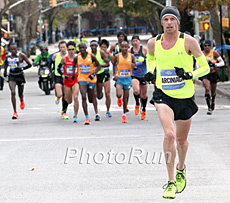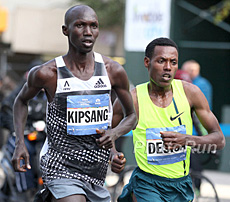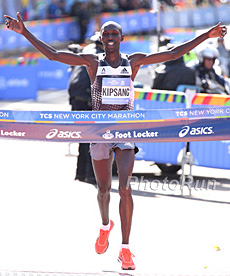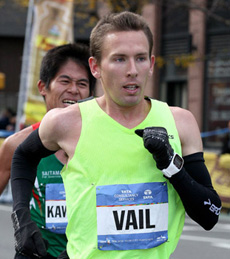|
Coverage Homepage
Post Race:
Men's Post-Race |
Women's Post-Race
| Complete Searchable Results
Pre-Race:
Men:
Men's Preview & Starter List
Women:
Women's Preview & Starter List
Head-to-Heads: Elite Athlete Past Matchups
Extras:
Pace Calculator/Pace Guide/Viewing |
Videos (Athletes/Archival/More...)
More News:
Press Releases |
News (other sources)
Featured Book/Movie:
Run For Your Life |
A Race Like No Other
The 44th Running of the New York City Marathon - The Men's Race
by John Elliott
Winds = Slow Times
Heavy winds on the day of the New York City Marathon caused race organizers to abandon the start line for the first race of the day, and the Wheelchair Marathon started at the three mile mark on the course to run a 23.2 mile marathon... While organizers did not alter the start for the elite athletes or the 50,000 runners who would follow, we knew the wind would be a factor in the race with a headwind for the first 20 miles and winds gusting from 20 to 40 miles per hour.
The New York City Marathon does not employ pacers to aim for fast finish times and states that it only cares about the competition and not the times. With that philosophy and with the concern for the win, the men's marathon started at a slow pace and ended with the slowest marathon finish in New York in twenty years. The slow initial pace allowed some aspiring runners run with the main pack and experience a race. But even with that pace, some of the best marathoners in the world had a difficult time on the day.
A Slow Start, Large Pack

photo: Victah Sailer/PhotoRun
Nick Arciniaga Leads the Pack
|
The men's race went out at a pace which would lead to a 2:14 marathon finish - but the men in the field had run 2:05 or 2:08 for the distance. Fifteen men ran together at that modest pace while most were hesitant to take the lead and break the wind. Because he knows no fear, American Meb Keflezighi took the lead for a few miles. Because the pace was slow and they could gain some television time, Americans Nick Arciniaga and Zach Hine took their place at the front of the pack to gain some television exposure. And because the pace was slow, Ryan Vail told us that he was excited to push himself and gain the experience of running with the lead pack for as long as he could (14 miles for Vail and leading to 9th place 2:15:08 finish). Through 21 miles, point-to-point course ran North into the wind and through that point ten men were still together, but thereafter the course turned south and the pace increased significantly.
Wind At Their Back - The Race Begins
Through 21 miles, the average mile pace was 5min5sec; but into mile 22, the runners - led at that point by Geoffrey Mutai and Wilson Kipsang - ran two 4min35sec miles in a row. Through the first of those miles, seven runners remained together, but only two could hold that pace for the two miles. Ultimately, two runners were alone at the front: Wilson Kipsang and Lelisa Desisa. Ten seconds behind them, two runners were together: Gebre Gebremariam and Geoffrey Mutai; and twenty seconds behind those two were two more: Stephen Kiprotich and Meb Keflezighi. Even with the slow start to the race, the massive pickup had tired out the other runners.
Kipsang and Desisa and $540,000

photo: Victah Sailer/PhotoRun
A Two Man Race: Kipsang and Desisa
|
On the day, Wilson Kipsang and Lelisa Desisa were the two strongest. And both were running strong. Kipsang seemed to set the pace and Desisa ran just behind, on his shoulder. And each time Kipsang would try to surge away, Desisa matched every move. The pace slowed a bit into mile 24, then increased into mile 25 and to mile 26 the men ran the fastest mile of the race. Kipsang surged again and gained a few feet, but Desisa caught and started to pass Kipsang going up to the final small hill on the course and the last 200 yards. As he passed Kipsang, Desisa knocked Kipsang's arm seeming to through both off their gait - but that was all that Desisa had and Kipsang surged again as Desisa simply gave up. Of course as much as a victory at the New York City Marathon is a great thing, Kipsang had one other incentive. Besides the $40,000 difference between the first and second place prize at the New York City Marathon, if Kipsang were to win he would also gain the prize for winning the World Marathon Majors series title: $500,000. To achieve the needed points, Kipsang had to finish first and not second; so the difference between first and second would be $40,000 from the race at hand plus $500,000 for the series or $540,000 in total. Kipsang told us later that he was planning the race and his tactics around that prize - and it worked.

photo: Victah Sailer/PhotoRun
Kipsang Adds to Legacy
|
Slow Times
Kipsang's winning time, 2:10:59 was the slowest winning time since 1995. And while the NYC Marathon purports not to care about time, they do have a time bonus structure in place providing increasing incentives for finish times faster than 2:10:00 all the way to faster than 2:05:00 - but for 2014, not a single man earned a bonus. But, with the sprint finish and the Kipsang's motivation, we saw good racing on the day.
Behind Kipsang/Desisa
Wilson Kipsang won the marathon in 2:10:59 and Desisa, after giving up chasing the win, finished seven seconds back in 2:11:06 - forever obscuring how close the race actually was. Behind them, Gebre Gebremariam, the 2010 champion and always a strong competitor in New York held onto his third position, well back in 2:12:13. Meb Keflezeghi stayed strong to the end to surprise many with his fourth place finish in 2:13:18 - as much an indication of his tenacity as the slowing of the other pro athletes.

photo: Victah Sailer/PhotoRun
Ryan Vail Runs Strong
|
The Americans
The couple of years leading to an Olympics is partly characterized by posturing and preparation in hopes of making the Olympic team. As such, each marathon that hosts Americans who might be contenders to make the Olympic marathon team gives us an opportunity to judge and rank the Americans. As such, the 2014 New York City Marathon confirmed that Meb Keflezighi remains the man to beat and the man most likely to make the Olympic Team. Ryan Vail, first American at New York in 2013, finished in ninth place and ran a strong race throughout. While his time was affected by the wind as were most, he showed that he is a tough and strong competitor. Behind Vail, Nick Arciniaga - the 2013 USA Marathon champion and a consistent finisher - ran fairly well, but for the first time showed some chinks in his armor and will need to figure out how to finish ahead of Vail in future marathons if he hopes to make the USA team.
Top Finishers
1. Wilson Kipsang (KEN) 2:10:59 - $100,000
2. Lelisa Desisa Benti (ETH) 2:11:06 - $60,000
3. Gebre Gebremariam (ETH) 2:12:13 - $40,000
4. Meb Keflezighi (USA) 2:13:18 - $25,000
5. Stephen Kiprotich (UGA) 2:13:25 - $15,000
6. Geoffrey Mutai (KEN) 2:13:44 - $12,500
7. Masato Imai (JPN) 2:14:36 - $10,000
8. Peter Cheruiyot Kirui (KEN) 2:14:51 - $5,000
9. Ryan Vail (USA) 2:15:08 - $3,000
10. Nick Arciniaga (USA) 2:15:39 - $2,000
11. Yuki Kawauchi (JPN) 2:16:41 - $1,500
12. Lusapho April (RSA) 2:16:50 - $1,000
13. Micah Kogo (KEN) 2:18:36
14. Danilo Goffi (ITA) 2:19:44
15. Stephan Shay (USA) 2:19:47
Coverage Homepage
Post Race:
Men's Post-Race |
Women's Post-Race
| Complete Searchable Results
Pre-Race:
Men:
Men's Preview & Starter List
Women:
Women's Preview & Starter List
Head-to-Heads: Elite Athlete Past Matchups
Extras:
Pace Calculator/Pace Guide/Viewing |
Videos (Athletes/Archival/More...)
More News:
Press Releases |
News (other sources)
Featured Book/Movie:
Run For Your Life |
A Race Like No Other
|








